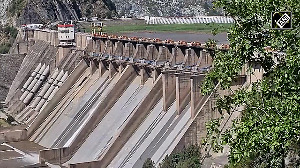Proposing radical fiscal reform in the budget, global rating agency Moody's Investor Services and India Inc have warned that 10 per cent economic growth rate will not be attained without reining in the fiscal deficit.
Moody's Vice President Kristin Lindow said very rapid growth will not be sustainable unless the fiscal situation is stabilised and more financial resources are freed up for social and physical infrastructure.
"The promise of comprehensive tax reforms is therefore very encouraging; we think this would be a very positive step in the right direction. So too is the emphasis on infrastructure development, but we would hope that this would come without sacrificing the goals of FRBM, which has still to establish its credibility," she said in her reply to a PTI questionnaire on the forthcoming Budget.
The Confederation of Indian Industry said desired level of growth requires a rise in investment level, for which it is essential to convert government's revenue deficit into surplus as this will add to the domestic savings pool and keep the cost of capital at internationally competitive levels.
"For a zero revenue deficit target, measures have to be taken to widen both the direct and indirect tax base, privatise loss-making PSUs and rationalise government expenditure," the CII said.
FICCI said that to attain growth rates close to 10 per cent, the investment rates in the economy should go up to 33 per cent.
Agriculture should grow at four per cent and the industry and services should expand at more than 11 per cent to push the economy on the path of 10 per cent growth rate, FICCI President Onkar Singh Kanwar said.
He said drastic measures should be initiated to curtail revenue deficit, which presupposes better targeting of subsidies to the poor.
There is a need to increase savings rate of the private sector as well as the public sector, Kanwar said.
"The current public sector dis-savings of two per cent of GDP should be reversed to make a positive saving of at least 2 per cent of GDP," he said.
Assocham said higher level of growth depends on investment, increased productivity and higher agricultural yields.
Its president M K Sanghi said efforts should be made to further prune subsidies in fertiliser, petroleum and food to rein in fiscal deficit.
"In addition, we still do not have an efficient tax system on account of which revenue slippages, particularly in indirect taxation, keep occurring," he said.
As such, compliance should be increased by bringing in a large number of people into the tax net, Sanghi added.
PHDCCI said the budget should focus on reform measures, which would give strategic importance to domestic demand so that it leads to improvement in investment climate and triggers growth impulses in the economy.
Demand growth would require the government to reduce its fiscal deficit by reducing its borrowing requirements for financing current expenditure, it said.
"This would serve to release resources, which would be utilised for investment in priority areas such as infrastructure," PHDCCI said.
ICRA Ltd Executive Director Amul Gogna said efforts should be made to widen the tax base, improve tax administration on the revenue side and curb non-plan expenditures through reduction in subsidies, interest payments.
Economists joined India Inc and rating agencies in highlighting the urgent need for reining in fiscal deficit.
B B Bhattacharya of Institute of Economic Growth said revenue deficit is a result of deceleration in tax-GDP ratio on the one hand and rising interest cost and subsidy on the other.
"Interest rate will now come down, but tax-GDP ratio can be improved only if there is a wider coverage of tax network, be it in services, and also reduced corruption in tax collection. Finally, subsidy has to be tackled at political level," Bhattacharya said
With these measures, the government can create more funds for infrastructure, he said.
"They will have a multiplier effect on the economy," Bhattacharya said.
National Institute of Public Finance and Policy Director M Govinda Rao said growth could be pushed up by focusing on fiscal reforms, further liberalisng the economy, undertaking financial sector reforms, speeding up agricultural investments and providing market connectivity to rural areas.
National Council of Applied Economic Research Fellow Devender Kumar Pant said the country's problem is not deficit per se but the quality of deficit as it is originating from the revenue side.
Besides, the ratio of revenue deficit to fiscal deficit is continuously rising, he added. If one looks at the component of expenditure, most of the revenue outlay is committed, like interest payment, wages, salary and pension, he said.
As such, only scope of reduction of expenditure is on subsidy front, which is politically volatile, he added.
"Hence revenue deficit has to be reduced by increasing revenue," Pant said.







 © 2025
© 2025